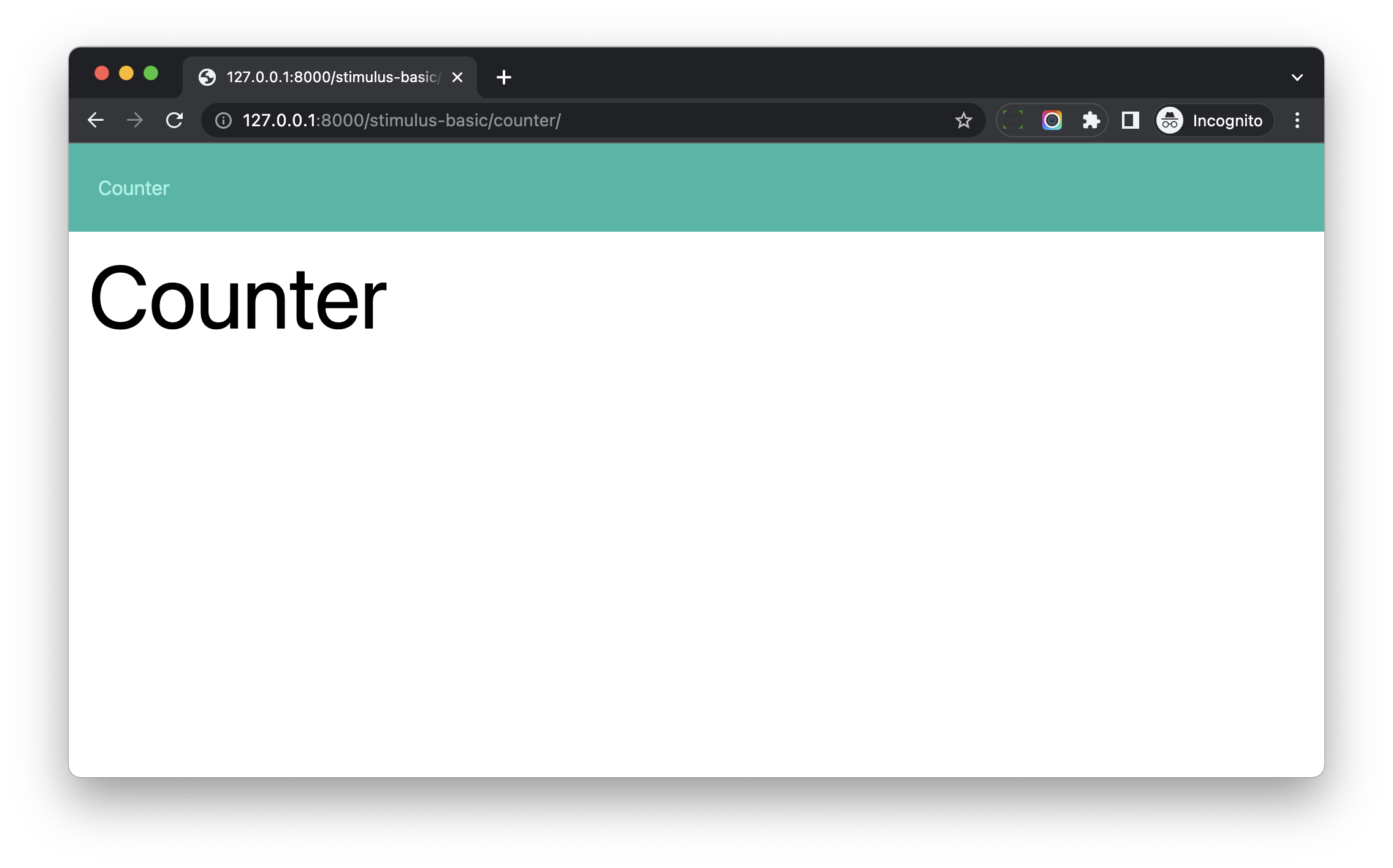Prepare Django app to learn Stimulus Basics
Objective
- Prepare Django app for us to learn
Stimulus
Django App
Let's create a Django app for us to test and learn Stimulus.
(venv)$ mkdir -p ./hotwire_django_app/stimulus_basic
(venv)$ python manage.py startapp stimulus_basic ./hotwire_django_app/stimulus_basic
We will have file structure like this
./hotwire_django_app
├── __init__.py
├── asgi.py
├── settings.py
├── stimulus_basic # new
├── tasks
├── templates
├── turbo_drive
├── turbo_frame
├── urls.py
└── wsgi.py
Update hotwire_django_app/stimulus_basic/apps.py to change the name to hotwire_django_app.stimulus_basic
from django.apps import AppConfig
class StimulusBasicConfig(AppConfig):
default_auto_field = 'django.db.models.BigAutoField'
name = 'hotwire_django_app.stimulus_basic' # update
Add hotwire_django_app.stimulus_basic to the INSTALLED_APPS in hotwire_django_app/settings.py
INSTALLED_APPS = [
...
'hotwire_django_app.stimulus_basic', # new
]
# check if there is any error
$ ./manage.py check
System check identified no issues (0 silenced).
View
Update hotwire_django_app/stimulus_basic/views.py
from django.shortcuts import render
def counter_view(request):
return render(request, 'stimulus_basic/counter.html')
Template
Create hotwire_django_app/templates/stimulus_basic/base.html
{% load webpack_loader static %}
<!DOCTYPE html>
<html>
<head>
<meta charset="utf-8" />
<meta name="viewport" content="width=device-width, initial-scale=1.0">
{% stylesheet_pack 'stimulus_basic' attrs='data-turbo-track="reload"'%}
{% javascript_pack 'stimulus_basic' attrs='data-turbo-track="reload" defer' %}
</head>
<body>
{% include 'stimulus_basic/navbar.html' %}
{% block content %}
{% endblock content %}
</body>
</html>
Notes:
- Please note in the template, we will use
stimulus_basicentry file. we will create it in a bit.
Create hotwire_django_app/templates/stimulus_basic/navbar.html
<nav class="flex items-center justify-between flex-wrap bg-teal-500 p-6 mb-4">
<div class="w-full">
<a href="{% url 'stimulus-basic:counter' %}" class="inline-block mt-0 text-teal-200 hover:text-white mr-4">
Counter
</a>
</div>
</nav>
Please note the URL namespace is stimulus-basic now.
Create hotwire_django_app/templates/stimulus_basic/counter.html
{% extends "stimulus_basic/base.html" %}
{% block content %}
<div class="w-full max-w-7xl mx-auto px-4">
<h1 class="text-4xl sm:text-6xl lg:text-7xl mb-6">Counter</h1>
</div>
{% endblock %}
Frontend
Create frontend/src/styles/stimulus_basic.scss
@import "tailwindcss/base";
@import "tailwindcss/components";
@import "tailwindcss/utilities";
Create frontend/src/application/stimulus_basic.js
// This is the scss entry file
import "../styles/stimulus_basic.scss";
import "@hotwired/turbo";
Notes:
- We import
stimulus_basic.scsswe just created - And this JS entry file would be used by the above
stimulus_basic/base.html
URL
Create hotwire_django_app/stimulus_basic/urls.py
from django.urls import path
from .views import counter_view
app_name = 'stimulus-basic'
urlpatterns = [
path('counter/', counter_view, name='counter'),
]
Notes:
- Here we use
app_nameto set thenamespaceof the Django app.
Update hotwire_django_app/urls.py
from django.contrib import admin
from django.urls import path, include
from django.views.generic import TemplateView
urlpatterns = [
path('', TemplateView.as_view(template_name="index.html")),
path('turbo-drive/', include('hotwire_django_app.turbo_drive.urls')),
path('turbo-frame/', include('hotwire_django_app.turbo_frame.urls')),
path('stimulus-basic/', include('hotwire_django_app.stimulus_basic.urls')), # new
path('admin/', admin.site.urls),
]
Manual test
Restart webpack, so the new entry file can work
$ npm run start
(venv)$ python manage.py runserver
Visit http://127.0.0.1:8000/stimulus-basic/counter/, you can see an empty page.

Now we have a Django app for us to test and learn Stimulus.